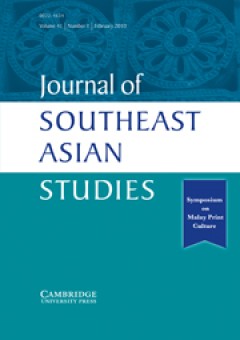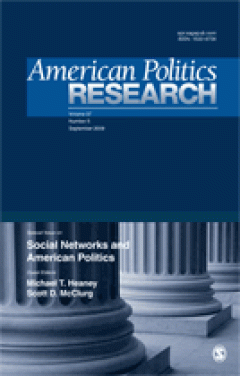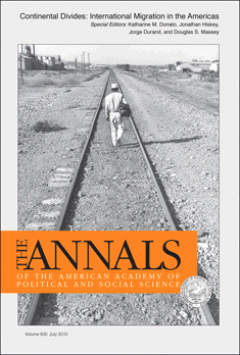Filter by

Viewspapers: The Malay press of the 1930s
There was a tremendous acceleration in newspaper publishing between 1930 and 1941 despite the Great Depression. The Malay press began to evolve into a site for discussing and debating the circumstances of Malay life in the 1930s. Rather than news, opinions, commentaries, leading articles and editorials made up the bulk of column space in Malay newspapers and magazines of the 1930s. It was a ‘vi…
- Edition
- Vol. 41, No. 1, February 2010. pp. 1-20
- ISBN/ISSN
- 00224634
- Collation
- -
- Series Title
- Journal of Southeast Asian Studies
- Call Number
- -

Negotiating the Great Depression: The rise of popular culture and consumerism…
The Great Depression (1929–35) seriously affected the world economy but it was also a catalyst of the development of political awareness among the Malays. In conjunction with the growth of political awareness there was the rise of consumerism, which also was accelerated by the Great Depression. People were taught to appreciate a new way of life centring around luxury goods that became cheaper a…
- Edition
- Vol. 41, No. 1, February 2010. pp. 21-45
- ISBN/ISSN
- 00224634
- Collation
- -
- Series Title
- Journal of Southeast Asian Studies
- Call Number
- -

Film Melayu: Nationalism, modernity and film in a pre-World War Two Malay mag…
Prior to World War Two many of the Malay-language films released in Singapore and Malaya were made in Java and the Philippines. Beginning in 1940 the Shaw Brothers began producing Malay films in Singapore for distribution to their theatre network throughout Malaya. The first Malay film magazine, Film Melayu, which began publishing in May 1941, documented the production and release of a number o…
- Edition
- Vol. 41, No. 1, February 2010. pp. 47-70
- ISBN/ISSN
- 00224634
- Collation
- -
- Series Title
- Journal of Southeast Asian Studies
- Call Number
- -

The writings of Abdul Rahim Kajai: Malay nostalgia in a crystal
Abdul Rahim Kajai (1894–1943), his life and his work, are discussed against the background of socio-cultural developments on the Malay Peninsula in the 1930s. A journalist, writer and author, Kajai played an important role in the emergence of notions of ‘Malayness’ which made Malays feel different from and hostile to the growing numbers of ‘others’ in the colony. In particular, his stories, spl…
- Edition
- Vol. 41, No. 1, February 2010. pp. 71-100
- ISBN/ISSN
- 00224634
- Collation
- -
- Series Title
- Journal of Southeast Asian Studies
- Call Number
- -

The Five Power Defence Arrangements and the reappraisal of the British and Au…
Working from recently declassified Australian and British government files, this paper examines the archival evidence on policy thinking in London and Canberra towards the Five Power Defence Arrangements (FPDA) during the period 1970–75. The article argues that one of the main reasons for the Heath government's decision to deploy a token military force in Southeast Asia as part of a multilatera…
- Edition
- Vol. 41, No. 1, February 2010. pp. 101-123
- ISBN/ISSN
- 00224634
- Collation
- -
- Series Title
- Journal of Southeast Asian Studies
- Call Number
- -

Not just fryers of bananas and sweet potatoes: Literate and literary women in…
I argue that women's literacy was more common than is usually supposed and that women engaged extensively with written literature, both as readers and writers. I also discuss the role of traditional Islamic education in transmitting literacy among girls. The article is based on the examination of a group of narrative poems written by women at the court of Penyengat.
- Edition
- Vol. 41, No. 1, February 2010. pp. 153-172
- ISBN/ISSN
- 00224634
- Collation
- -
- Series Title
- Journal of Southeast Asian Studies
- Call Number
- -

The question of ‘China’ in Burmese chronicles
Historical studies of Burma–China relations have emphasised warfare, seen from the perspective of Chinese sources. One commonly studied event is the thirteenth-century Mongol invasion of Bagan. Burmese sources describe the flight of King Narathihapate (1257–87) from the Mongols, thus earning the Burmese epithet ‘Taruppye’. ‘Tarup’ now refers to the Chinese, but the identities of the people and …
- Edition
- Vol. 41, NO. 1, February 2010. pp. 125-152
- ISBN/ISSN
- 00224634
- Collation
- -
- Series Title
- Journal of Southeast Asian Studies
- Call Number
- -

Publication Bias in Two Political Behavior Literatures
Publication bias occurs when the probability that a paper enters the scholarly literature is a function of the magnitude or significance levels of the coefficient estimates. We investigate publication bias in two large literatures in political behavior: economic voting and the effects of negative advertising. We find that the pattern of published estimates is consistent with the presence of pub…
- Edition
- vol. 38 no. 4, July 2010. pp. 591-613
- ISBN/ISSN
- 1532673x
- Collation
- -
- Series Title
- American Politics Research
- Call Number
- -

Segregation, Immigration, and Latino Participation in Ethnic Politics
This article examines the way in which racial/ethnic context influences Latino support for ethnic political causes. Welch et al. argue that feelings of solidarity within the African American community intensify as the size of the African American population in an individual’s residential environment increases. We extend this hypothesis to Latinos, while also considering how other scholars have …
- Edition
- Vol. 38 no. 4, July 2010. pp. 614-635
- ISBN/ISSN
- 1532673x
- Collation
- -
- Series Title
- American Politics Research
- Call Number
- -

The Role of Economic Reliance in Defense Procurement Contracting
This article examines how a defense sector presence in sparsely populated areas influences (a) House of Representatives defense committee assignments and (2) defense procurement allocations from 1999 to 2005. Although previous work had shown that prime contracts typically flow to headquarter locations, this article goes beyond existing research by tracking the distribution of defense expenditur…
- Edition
- vol. 38 no. 4, July 2010. pp. 636-675
- ISBN/ISSN
- 1532673x
- Collation
- -
- Series Title
- American Politics Research
- Call Number
- -

The Impact of Corruption on Social Trust
I test the impact of governmental corruption on generalized social trust. Based on prior research in comparative politics and criminology, I hypothesize that increasing governmental corruption leads to decreasing beliefs that others are trustworthy. To test my hypothesis, I combine aggregate state-level data on convictions for governmental corruption with American National Election Studies pane…
- Edition
- Vol. 38 no. 4, July 2010. pp. 676-690
- ISBN/ISSN
- 1532673x
- Collation
- -
- Series Title
- American Politics Research
- Call Number
- -

Counting Congress In: Patterns of Success in Judicial Nomination Requests by …
The power to nominate and confirm federal judges is shared by Congress and the president, yet few works explicitly address the role that Congress plays in shaping the preselection pool for judicial nominees. In this article, we illuminate this debate by exploring judicial nomination requests from Members of Congress to the Eisenhower and Ford Administrations. In explaining who is nominated, the…
- Edition
- Vol. 38 no. 4, July 2010. pp. 691-717
- ISBN/ISSN
- 1532673x
- Collation
- -
- Series Title
- American Politics Research
- Call Number
- -

Canvasser Affect and Voter Response: Results From National Focus Groups
The experimental literature on voter mobilization establishes the efficacy of canvassing as a tool of voter mobilization. However, the current literature gives scant attention to the question of whether some types of canvassers may be more effective than others. This article takes the first step toward developing a positive theory of effective or ineffective canvassing. Using descriptive, quali…
- Edition
- Vol. 38 no. 4, July 2010. pp. 718-758
- ISBN/ISSN
- 1532673x
- Collation
- -
- Series Title
- American Politics Research
- Call Number
- -

Sources of Economic News and Economic Expectations
This article considers the process by which local economic news coverage influences individual evaluations of the economy. We improve on prior research by capturing a wider range of news sources (including national network news, national newspapers, local television news, and local newspapers) and connecting the effects of this coverage on individual level attitudes. We find that current person…
- Edition
- Vol. 38 no. 4, July 2010. pp. 759-777
- ISBN/ISSN
- 1532673x
- Collation
- -
- Series Title
- American Politics Research
- Call Number
- -

New World Orders: Continuities and Changes in Latin American Migration
Although migration from Mexico to the United States is more than a century old, until recently most other countries in Latin America did not send out significant numbers of migrants to foreign destinations. Over the past thirty years, however, emigration has emerged as an important demographic force throughout the region. This article outlines trends in the volume and composition of the migrant…
- Edition
- Vol. 630 no. 1, July 2010. pp. 20-52
- ISBN/ISSN
- 00027162
- Collation
- -
- Series Title
- The ANNALS of the American Academy of Political and Social Science
- Call Number
- -

Pioneers and Followers: Migrant Selectivity and the Development of U.S. Migra…
The authors present a method for dividing the historical development of community migration streams into an initial period and a subsequent takeoff stage with the purpose of systemically differentiating pioneer migrants from follower migrants. The analysis is organized around five basic research questions. First, can we empirically identify a juncture point in the historical development of comm…
- Edition
- Vol. 630 no. 1, July 2010. pp. 53-77
- ISBN/ISSN
- 00027162
- Collation
- -
- Series Title
- The ANNALS of the American Academy of Political and Social Science
- Call Number
- -

U.S. Migration from Latin America: Gendered Patterns and Shifts
Since the second half of the twentieth century, studies have documented the presence of women and men among migrants to and from Latin America. This study analyzes gendered patterns of U.S. migration from a variety of nations south of the border and examines how the probabilities of migrating on a first U.S. trip shift over the life course and by legal status. Using life history data from the M…
- Edition
- Vol. 630 no. 1, July 2010. pp. 78-92
- ISBN/ISSN
- 00027162
- Collation
- -
- Series Title
- The ANNALS of the American Academy of Political and Social Science
- Call Number
- -

Gender Differences between Mexican Migration to the United States and Paragua…
This article deals with the issue of gender and migration in a comparative manner. It aims at identifying factors that affect the gender composition of migratory streams, including family formation and children. It compares two contrasting streams: Mexican migration to the United States, which has traditionally been male-dominated; and Paraguayan migration to Argentina, which comprises a larger…
- Edition
- Vol. 630 no. 1, July 2010. pp. 93-113
- ISBN/ISSN
- 00027162
- Collation
- -
- Series Title
- The ANNALS of the American Academy of Political and Social Science
- Call Number
- -

Transition Shocks and Emigration Profiles in Latin America
Scholars have long recognized the impact transformative political events have had on migration patterns in individual countries, but few have extended these ideas to the current period of political transition taking place across Latin America. Through analysis of data from the Latin American Migration Project (LAMP) and the Mexican Migration Project (MMP) from across Peru, Nicaragua, and the Me…
- Edition
- Vol. 630 no. 1, July 2010. pp. 116-136
- ISBN/ISSN
- 00027162
- Collation
- -
- Series Title
- The ANNALS of the American Academy of Political and Social Science
- Call Number
- -

Search of Peace: Structural Adjustment, Violence, and International Migration
The authors analyze the effects of structural adjustment and violence on international migration from selected countries in Latin America by estimating a series of event history models that predicted the likelihood of initial migration to the United States as a function of the murder rate, economic openness, and selected controls in the country of origin. Although several theories posit a conne…
- Edition
- Vol. 630 no. 1, July 2010. pp. 137-161
- ISBN/ISSN
- 00027162
- Collation
- -
- Series Title
- The ANNALS of the American Academy of Political and Social Science
- Call Number
- -
 Computer Science, Information & General Works
Computer Science, Information & General Works  Philosophy & Psychology
Philosophy & Psychology  Religion
Religion  Social Sciences
Social Sciences  Language
Language  Pure Science
Pure Science  Applied Sciences
Applied Sciences  Art & Recreation
Art & Recreation  Literature
Literature  History & Geography
History & Geography